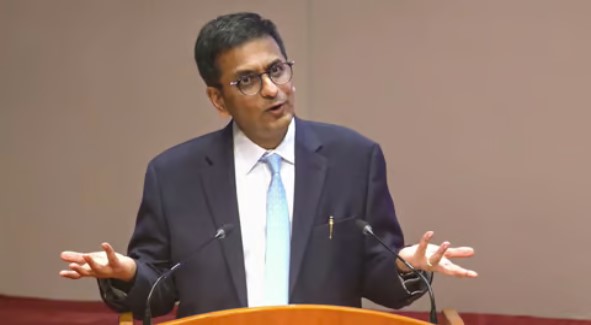 As Chief Justice Dhananjaya Yeshwant Chandrachud prepares to retire, the Indian legal community is bidding farewell to one of the most respected and progressive judges in the country’s history. Appointed as the 50th Chief Justice of India on November 9, 2022, Justice Chandrachud leaves behind a trail of landmark decisions that have shaped Indian law and brought about significant changes in the country’s legal landscape.
As Chief Justice Dhananjaya Yeshwant Chandrachud prepares to retire, the Indian legal community is bidding farewell to one of the most respected and progressive judges in the country’s history. Appointed as the 50th Chief Justice of India on November 9, 2022, Justice Chandrachud leaves behind a trail of landmark decisions that have shaped Indian law and brought about significant changes in the country’s legal landscape.
Born on November 11, 1959, Justice Chandrachud comes from a prominent legal family. His father, Justice Y.V. Chandrachud, served as Chief Justice of India from 1978 to 1985. Following in his father’s footsteps, Justice Chandrachud has made an indelible mark on the Indian judiciary with his progressive rulings and strong commitment to human rights and equality.
After completing his education at St. Stephen’s College in Delhi and Harvard Law School, he started his legal career in 1982 as a lawyer in the Supreme Court of India. He was appointed as a judge of the Bombay High Court in 2000 and elevated to the Supreme Court in 2016. In 2022, he was appointed as Chief Justice, and his leadership has been marked by a focus on judicial reforms, transparency, and access to justice.
Key Judgments and Contributions
Throughout his career, Justice Chandrachud has delivered several landmark judgments that have had a lasting impact on Indian society. Some of his most notable contributions include:
- Decriminalization of Homosexuality (Navtej Singh Johar v. Union of India, 2018): Justice Chandrachud played a crucial role in the decriminalization of homosexuality by striking down parts of Section 377 of the Indian Penal Code, which criminalized consensual same-sex relations. This decision was a major victory for LGBTQ+ rights in India.
- Right to Privacy (K.S. Puttaswamy v. Union of India, 2017): In the Right to Privacy case, Justice Chandrachud was part of the bench that ruled that privacy is a fundamental right under India’s Constitution. His dissent in the case strongly defended personal autonomy and laid the foundation for future privacy-related rulings.
- Sabarimala Case (Indian Young Lawyers Association v. State of Kerala, 2018): Justice Chandrachud’s support for gender equality was evident in the Sabarimala case, where the Supreme Court lifted the ban on women entering the Sabarimala temple. His judgment highlighted the importance of religious freedom and gender equality.
- Adultery Law (Joseph Shine v. Union of India, 2018): Justice Chandrachud was also part of the bench that struck down Section 497 of the Indian Penal Code, which made adultery a criminal offense. This judgment emphasized gender equality and individual rights, making it a landmark ruling.
- Ayodhya Verdict (2019): In the Ayodhya case, Justice Chandrachud was part of the bench that ruled in favor of building a Ram temple at the disputed site. However, his dissenting opinion focused on ensuring fairness and justice in the matter, stressing the importance of historical context.
- Transgender Rights (National Legal Services Authority v. Union of India, 2014): Justice Chandrachud was also instrumental in the historic NALSA case, where the Supreme Court recognized transgender individuals as a third gender, guaranteeing them fundamental rights and protections under the Constitution.
Leadership as Chief Justice
During his time as Chief Justice, Justice Chandrachud focused on improving the efficiency of the judicial system and making courts more accessible to the public. His leadership was characterized by efforts to reduce case backlogs and promote virtual hearings—a crucial step during the COVID-19 pandemic. He also worked to increase transparency in the judicial process, making court proceedings and judgments more accessible online.
Justice Chandrachud also championed the use of technology in the courts to speed up justice delivery, making the system more efficient and transparent. His tenure as CJI has been marked by a commitment to fairness, justice, and equal rights for all citizens.
A Legacy of Justice and Equality
Chief Justice Chandrachud’s tenure will be remembered for his human-rights-oriented decisions, especially in the areas of gender equality, privacy, and social justice. His rulings have made a significant difference in the lives of marginalized groups, including the LGBTQ+ community, women, and transgender people. His progressive approach has ensured that the Indian judiciary remains relevant and responsive to the changing needs of society.
Justice Chandrachud’s influence on the Indian legal system extends beyond his judgments. He has played an instrumental role in shaping judicial reforms that will impact the legal community for years to come. His legacy is one of fairness, integrity, and a tireless commitment to protecting the rights of every individual.
Farewell
As Chief Justice Dhananjaya Yeshwant Chandrachud steps down, his contributions to Indian law will continue to resonate for generations. His leadership and visionary judgments have set new standards for the Indian judiciary, ensuring that the values of justice, equality, and freedom remain at the heart of the legal system. Justice Chandrachud leaves behind a judiciary that is more accessible, transparent, and responsive to the needs of the people.
India bids farewell to a judge who not only upheld the law but also worked tirelessly to make it more just and inclusive for all citizens. His legacy will continue to inspire future generations of lawyers and judges, and his influence will be felt for many years to come.




